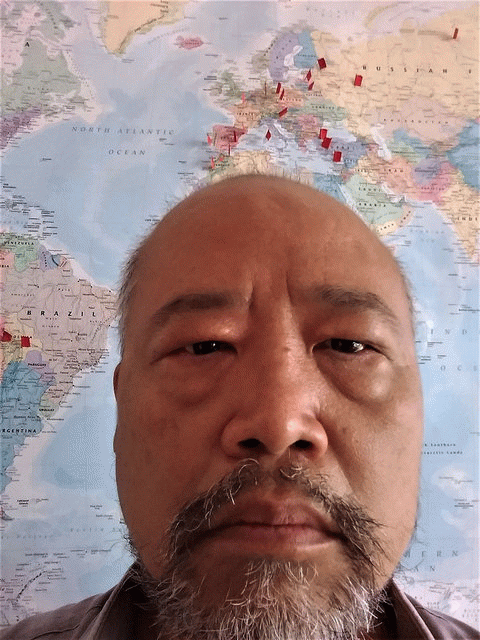I've just been interviewed by al Riyadh, a Saudi Arabian newspaper. Below is the unedited, English version:
Firstly, how do like to introduce yourself. Are you a Vietnamese or an American writer?
-Since I write in both English and Vietnamese, I can rightly claim to be an American writer, and a Vietnamese one. Having published ten books in English, however, I'm primarily an American author. As a racial minority, I must be careful to not be marginalized. My latest book, Postcards from the End of America, is an insider's account of a collapsing United States. Here, I speak as an American, for all Americans.
-I wish I could have one more life, so I could have another chance at painting. As a young man, I was consumed by poetry, and though I still believe in it, it is with a much cooler, and perhaps sadder, emotion. I have a new book of poems, A Mere Rica, a wordplay that means, To the Rich Mother. I'm finishing a novel, Trace Vapour. Except when I'm home writing, I'm always photographing. I just returned from eight days in Mexico City, observing and photographing. Street photography makes me more socially adventurous, an antidote to the isolation of writing. I work from an inner compulsion, and my favorite art form is whatever I'm currently engaged with.
You have translated many works (for you and for others). How does the process differ between translating someone else's work and translating your own?
-I've published one anthology of new Vietnamese fiction, and one on poetry. I have also translated international authors into Vietnamese. My one collection of poems in Vietnamese includes works written directly in Vietnamese, as well as variations from my English poems. Translating other people, I'm very strict, conscientious and a willing, self-effacing slave. As a translator also, surely you're aware of its many pitfalls. Unlike a writer, a translator can flaunt his incompetence in two languages!
Could you talk us about Vietnamese literature and its main issues?
-Vietnamese literature is quite diverse, but if one must generalize, one can say that there's a deep awareness of history and the more tragic aspects of life. Being born into a small country that's nearly always threatened by outside forces shapes the collective psychology. The national epic poem, Tale of Kieu, is about a prostitute. Vietnamese know full well that life is a series of often bitter compromises. In Hanoi twenty years ago, I often heard, "Bia' � �t r"i, kha' �? la' � �m, nà �i mà �i!" It's from a 1936 novel by Vu Trong Phung. Loosely translated, it means, "I know already, I suffer much, you talk too much!" The Vietnamese ability to laugh in just about any situation can baffle foreigners.
You worked in many jobs and moved to many countries. Could you tell us about the impact of all that on your literary experience?
-As an adult, I've lived in the US, Vietnam, Italy, England and Germany, and I've visited many more countries. Every society has evolved from an utterly unique set of beliefs and experiences. In the West, the idea that borders don't really matter has infected many minds, especially those that are relatively untouched by experiences, books or travels, but this madness shall soon pass. Crossing many borders, I know that they are sacred. Much blood has been spilled over every inch.
Is there an influence of the Vietnam War on your writing experience?
-The Vietnam War has taught me that history must be contested, geography is fate, courage is often wasted, cowardice and perfidy are often rewarded, giving birth to a child may be the ultimate cruelty and mass violence is a spectator sport.
By reminding the Vietnam War. Are you now fighting another war against American capitalism?
-The United States has a frightful record of sowing chaos and destruction in countless places, and though it has routinely failed to win wars, its military contractors always make tons of money, so all is well, according to the American ruling elite. War is America's main business.
(Note: You can view every article as one long page if you sign up as an Advocate Member, or higher).






